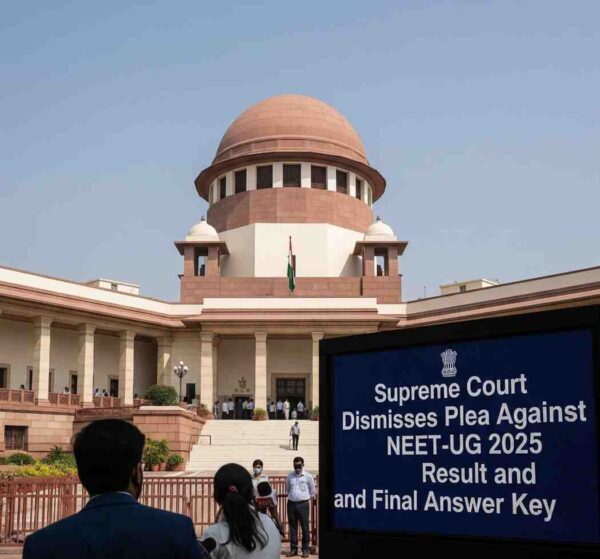The Supreme Court has turned down a plea against the NEET-UG 2025 final answer key and results, reaffirming its steadfast stance against interfering in nationwide entrance exams. Explore the details of the court’s ruling, its broader impact, and what it signifies for NEET candidates. Learn about the court’s decision, its implications, and what it means for NEET aspirants.
Supreme Court Rejects Petition Against NEET-UG 2025 Results and Answer Key
The Supreme Court of India has once again upheld its principle of non-interference in national-level entrance examinations by dismissing a petition challenging the National Eligibility cum Entrance Test (Undergraduate) or NEET-UG 2025 final results and answer key. This ruling reaffirms the judiciary’s cautious approach towards meddling in examination processes governed by specialized testing authorities like the National Testing Agency (NTA).
Background: The NEET-UG 2025 Controversy
The NEET-UG 2025 examination, conducted by the NTA, saw participation from nearly 25 lakh students aspiring for seats in MBBS, BDS, AYUSH, and other undergraduate medical programs across India. Following the declaration of results, several candidates raised objections regarding the accuracy of the final answer key and the result calculation methodology.
These objections led to legal petitions being filed in various High Courts and eventually escalated to the Supreme Court. The core of the petition revolved around alleged discrepancies in the answer key and questions related to the fairness and transparency of the evaluation process.
Supreme Court’s Observation and Verdict
A bench led by Chief Justice of India (CJI) D.Y. Chandrachud, along with Justices J.B. Pardiwala and Manoj Misra, dismissed the plea, stating unequivocally that the court would not intervene in the functioning of national-level exams unless there is a clear case of “arbitrariness or mala fide intent”.
The court emphasized that the NTA, being a specialized body entrusted with conducting high-stakes examinations, follows a scientific and transparent process for preparing answer keys, evaluating responses, and declaring results. The judgment clarified that every candidate is subject to the same set of conditions and processes, and selective intervention would disrupt the integrity of the examination system.
Key Points from the Supreme Court Judgment
- No Evidence of Malpractice: The court found no conclusive evidence indicating that the NTA had acted unfairly or with malicious intent. The allegations, according to the bench, were based on conjectures and lacked substantial proof.
- Significance of Finality in Examinations: The bench emphasized that national-level entrance exams like NEET-UG shape the academic and professional futures of millions of students. Permitting disputes over answer keys after the results have been announced could disrupt the admission process, postpone academic schedules, and lead to unnecessary confusion and instability for all candidates.
- Expert Committee Review: The NTA’s standard operating procedure includes a rigorous answer key review process by expert panels. The Court reaffirmed that unless there is a demonstrable lapse in this process, judicial review is unwarranted.
- Precedents and Judicial Restraint: Citing previous cases, the court reiterated its consistent judicial restraint when it comes to academic matters. Unless a case involves gross injustice or clear illegality, courts should refrain from intervening.
Implications of the Supreme Court Decision
The judgment will notably influence key participants in the NEET-UG framework, including students, administrators, and institutions:
- For Students: The ruling puts an end to any lingering hopes of changes in the final results. While some students may feel disappointed, the judgment offers clarity and allows candidates to plan their next steps—whether it’s participating in the counseling process, preparing for reattempts, or exploring alternative pathways.
- For NTA: The judgment serves as a firm endorsement of the NTA’s procedures and guidelines. It strengthens the agency’s credibility and enhances public confidence in its capacity to administer fair and standardized examinations.
- For Judiciary and Policy: The ruling reinforces the separation of powers and encourages academic autonomy. It also sets a precedent discouraging frivolous litigation around competitive exams without concrete evidence of wrongdoing.
Public Reactions
Reactions to the verdict have been mixed. Many education experts and academicians have welcomed the verdict, citing the need for finality and discipline in the examination system. On the other hand, sections of students and parents who were expecting relief expressed dissatisfaction, calling for more transparency in the evaluation process.
However, several former judges and legal scholars have endorsed the Supreme Court’s stance, stating that judicial overreach in exam matters can cause more harm than good, especially when dealing with large-scale standardized testing mechanisms.
The Road Ahead
With the court’s decision now in place, NEET-UG 2025 counseling and admission processes will continue without further legal hurdles. Students are advised to focus on upcoming phases of counseling, such as choice filling, document verification, and seat allotment.
Candidates who feel aggrieved by their performance or the results can consider future attempts, as NEET-UG allows multiple chances within the permissible age and qualification criteria.
Conclusion
The Supreme Court’s dismissal of the plea against NEET-UG 2025 final results and answer key reaffirms its long-standing position of non-interference in academic evaluations. While some aspirants may be disheartened, the judgment brings much-needed stability to the system. It serves as a reminder that institutional integrity, transparency, and finality are essential pillars of a robust examination process.
As NEET-UG remains the gateway to medical education in India, maintaining faith in its procedural fairness is crucial, not just for aspirants but for the education ecosystem as a whole.

























